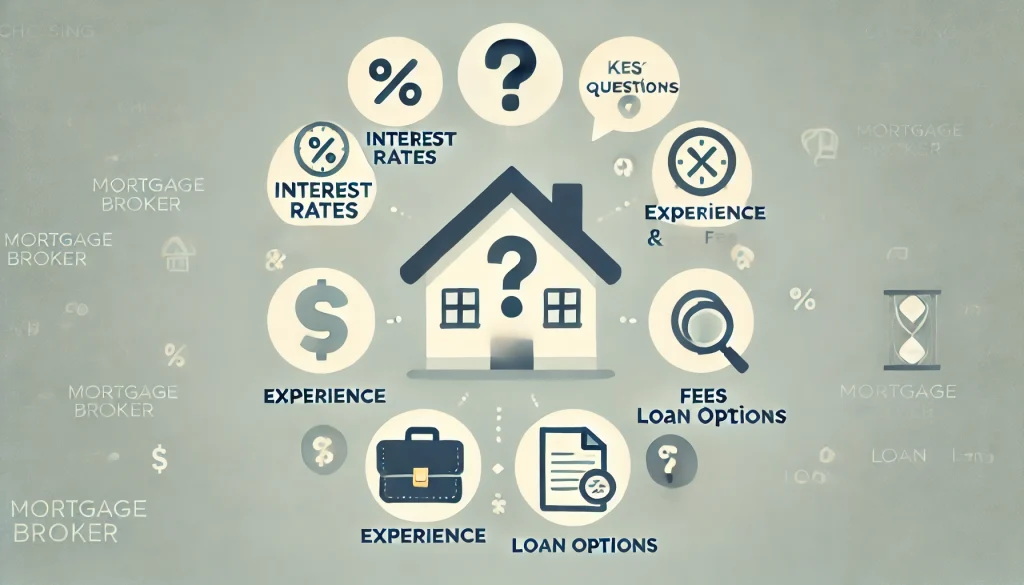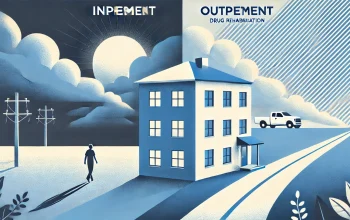How to Select the Right Mortgage Broker: 13 Essential Questions

When you’re in the process of buying a home, one of the most critical decisions you’ll make is choosing the right mortgage broker. A mortgage broker acts as a middleman between you and potential lenders, helping you find the best mortgage product based on your financial situation and needs. Selecting the right broker can save you money and time, but how do you know which one is the best fit?
This guide provides the essential questions you should ask when choosing a mortgage broker in your area. It will help you make an informed decision and ensure that you’re working with someone who has your best interests in mind.
Table of Contents
1. What Is Your Experience and Background in the Mortgage Industry?
Experience matters when it comes to choosing a mortgage broker. A broker with years of experience is more likely to have established relationships with lenders, giving them access to a wider variety of loan products. Ask about their background in the industry and whether they specialize in certain types of loans, such as first-time homebuyer loans, refinancing, or jumbo loans.
Why It’s Important:
- A more experienced broker is likely to understand the nuances of the mortgage process better.
- They will have knowledge of local markets, lending requirements, and potential hurdles you may face.
Follow-Up Questions:
- How long have you been a mortgage broker?
- How many clients have you worked with in my area?
- Do you specialize in any particular types of loans?
2. What Lenders Do You Work With?
Mortgage brokers typically have relationships with a variety of lenders, including banks, credit unions, and private lenders. Knowing which lenders a broker works with can help you determine whether you’ll have access to a wide range of mortgage products or only a limited selection.
Why It’s Important:
- Brokers with access to multiple lenders can shop around for the best rates and terms, potentially saving you money.
- You’ll want to ensure they aren’t biased toward a particular lender or loan type.
Follow-Up Questions:
- Do you work with both big banks and smaller local lenders?
- How many lenders do you typically compare for your clients?
- Are there any lenders you prefer working with?
3. How Are You Compensated?
Mortgage brokers earn money in two main ways: through fees paid by the borrower or commissions paid by the lender. It’s crucial to understand how your broker is compensated to avoid any potential conflicts of interest. Brokers who are paid by the lender may steer you toward loans that benefit them financially but may not be in your best interest.
Why It’s Important:
- Knowing how your broker is compensated ensures transparency.
- It helps you understand if there’s any potential bias toward certain lenders or loan products.
Follow-Up Questions:
- Do you charge any fees upfront, or is your compensation paid by the lender?
- Can you provide a breakdown of all fees associated with my loan?
- Are there any hidden fees I should be aware of?
4. What Types of Mortgages Can You Offer?
There are various mortgage products available, including fixed-rate mortgages, adjustable-rate mortgages (ARMs), FHA loans, VA loans, and jumbo loans. Not all brokers have access to the same types of mortgages, so it’s important to know what they can offer you.
Why It’s Important:
- A broker who can offer a wide range of loan types will have more options to suit your financial needs.
- Some brokers may specialize in specific types of loans, which can benefit you if you have a unique situation, such as needing a VA loan or a low down payment option.
Follow-Up Questions:
- Do you have access to government-backed loans like FHA and VA?
- Can you explain the differences between fixed-rate and adjustable-rate mortgages?
- Do you offer loans for investment properties?
5. What Interest Rates Are Available?
Interest rates are a critical factor when choosing a mortgage because they directly impact your monthly payments and the total cost of your loan over time. While mortgage rates fluctuate based on the market, your broker should be able to offer competitive rates. Be sure to ask whether they can lock in a rate and for how long.
Why It’s Important:
- Even a small difference in interest rates can save you thousands of dollars over the life of the loan.
- Understanding the rate-lock process can prevent you from paying more if rates increase before your loan is finalized.
Follow-Up Questions:
- What’s the current interest rate for the type of mortgage I’m interested in?
- Can you explain how rate locks work and whether you offer them?
- Are there any rate discounts or promotions available?
6. Can You Explain the Fees Associated with the Loan?
In addition to your mortgage payments, there are various fees associated with securing a loan. These may include origination fees, application fees, appraisal fees, and closing costs. It’s important to ask your broker for a clear breakdown of all fees to ensure you understand the full cost of your loan.
Why It’s Important:
- Hidden or unexpected fees can quickly add up, significantly increasing your overall costs.
- Transparency about fees helps you compare loan options accurately.
Follow-Up Questions:
- What are the total fees I’ll need to pay upfront and at closing?
- Can you provide a Loan Estimate detailing all the costs involved?
- Are there any fees that I can negotiate or waive?
7. How Long Will the Mortgage Process Take?
The mortgage process typically takes between 30 and 60 days, but this can vary depending on the complexity of your loan and how quickly documentation is submitted. Ask your broker how long they expect the process to take and whether there are any potential delays you should be aware of.
Why It’s Important:
- Knowing the timeline helps you plan your home purchase or refinance accordingly.
- Delays can cause complications, such as losing a locked-in rate or missing a closing deadline.
Follow-Up Questions:
- What’s the typical timeline for the loan approval process?
- Are there any factors that could cause delays in processing my loan?
- How can I help speed up the process?
8. What Documents Will I Need to Provide?
Applying for a mortgage requires significant documentation, including proof of income, tax returns, bank statements, and credit history. Your broker should provide you with a list of required documents early in the process to ensure there are no delays.
Why It’s Important:
- Providing all necessary documentation upfront can help streamline the loan process.
- Missing or incomplete documents can lead to delays or even loan denial.
Follow-Up Questions:
- Can you provide a checklist of all the documents I’ll need?
- Are there any special requirements based on my financial situation?
- How long will it take to review my documents?
9. What Is the Minimum Credit Score You Require?
Different mortgage lenders have varying requirements when it comes to credit scores. A higher credit score generally results in better loan terms and lower interest rates. Ask your broker what the minimum credit score requirement is for different loan types and whether they have any recommendations for improving your score.
Why It’s Important:
- Knowing the credit score requirements ahead of time helps you determine whether you qualify for a mortgage.
- Understanding your score and how to improve it can help you secure a better loan.
Follow-Up Questions:
- What’s the minimum credit score required for an FHA loan? A conventional loan?
- Can you help me improve my credit score if needed?
- How will my credit score impact the interest rate I receive?
10. How Much Should I Expect for a Down Payment?
Down payments are a significant part of the home-buying process, and different loans require different amounts. While conventional loans may require a down payment of 20%, some government-backed loans (such as FHA or VA loans) may require much less.
Why It’s Important:
- Understanding your down payment requirements helps you plan financially.
- A larger down payment can lead to lower monthly payments and better loan terms.
Follow-Up Questions:
- What’s the minimum down payment required for my loan type?
- Can I qualify for any down payment assistance programs?
- Will I need private mortgage insurance (PMI) if I put down less than 20%?
11. How Do You Handle Pre-Approval?
A mortgage pre-approval is an important step in the home-buying process, giving you an estimate of how much you can borrow. It also shows sellers that you are a serious buyer. Ask your broker about the pre-approval process, what’s involved, and how long the approval is valid.
Why It’s Important:
- A pre-approval helps you set a realistic budget for your home search.
- It speeds up the process when you’re ready to make an offer on a home.
Follow-Up Questions:
- What’s involved in the pre-approval process?
- How long is the pre-approval valid for?
- Can I get pre-approved before finding a home?
12. Can You Provide Client References?
A reputable mortgage broker should be willing to provide references or testimonials from past clients. Hearing from others who have worked with the broker can give you insight into their professionalism, communication, and ability to deliver results.
Why It’s Important:
- References can give you confidence in your decision and help you avoid working with a broker who may not have your best interests in mind.
- Positive reviews indicate a track record of satisfied clients.
Follow-Up Questions:
- Can you provide contact information for recent clients?
- Do you have online reviews or testimonials I can read?
13. Will You Be My Main Point of Contact Throughout the Process?
In some cases, mortgage brokers may hand you off to other team members once the application process starts. Make sure you understand who your main point of contact will be and how communication will be handled throughout the process.
Why It’s Important:
- Clear communication is essential during the mortgage process to ensure everything runs smoothly.
- Knowing who to contact with questions can reduce confusion and stress.
Follow-Up Questions:
- Will I be working with you directly throughout the entire process?
- How often can I expect updates on my loan status?
- What’s the best way to reach you if I have questions?
Conclusion
Choosing the right mortgage broker can make all the difference when securing a loan for your dream home. By asking these essential questions, you’ll be well-equipped to make an informed decision and find a broker who has your best interests at heart. A knowledgeable and transparent broker can guide you through the complex mortgage process, ensuring you secure the best rates and terms tailored to your needs.
Final Tip:
Don’t hesitate to interview multiple brokers to compare their responses. Each broker may have different strengths, and the goal is to find one that aligns with your financial goals and offers the best service. Happy house hunting!


